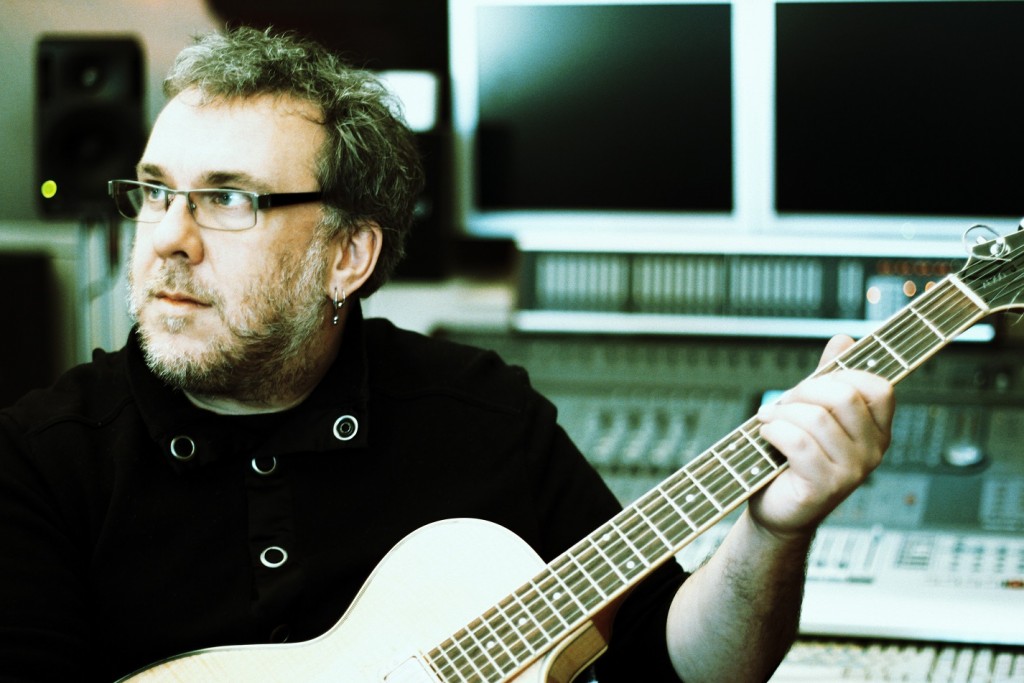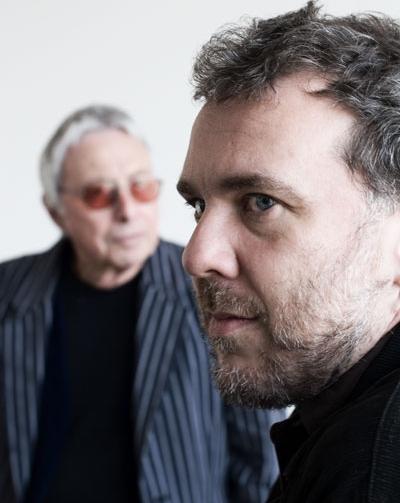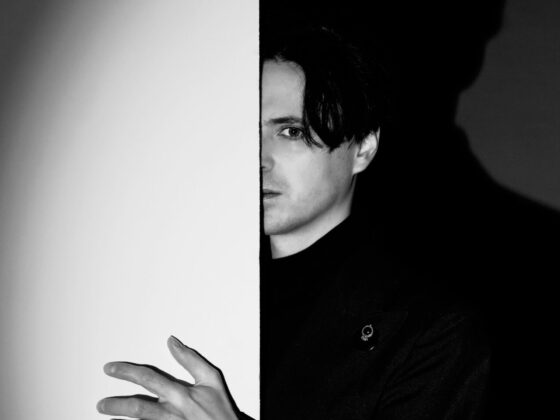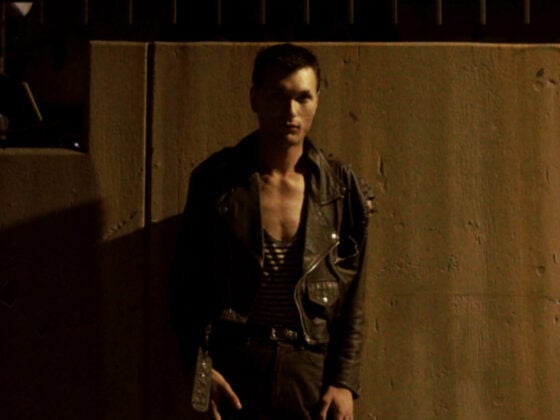In 2014 we interviewed Cocteau Twins’ Founder/Maestro/Guitarist Robin Guthrie. Robin was a pleasure to talk to, and we discussed 4AD and their recent reissue campaigns, plus Cocteau Twins and This Mortal Coil. We also spoke about his scoring work with Gregg Araki, such as the upcoming film “White Bird in a Blizzard”, starring Shailene Woodley, and Eva Green, which should be available to watch online this Wednesday, the 25th.
During the interview, we also discussed Robin releasing another record with Harold Budd, and an LP Mark Gardener of Ride.
PP: So there are these recent vinyl reissues of Blue Bell Knoll and Heaven or Las Vegas, and people focus a lot on the Cocteau Twins but I’ve noticed that you’re always busy, there’s always a new project, always producing something, collaborating with someone, etc. For example, I really enjoyed what you did with Mark Gardener recently.
RG: Oh you’ve got a treat coming because I’ve done a whole album with him, that’s going to come. It’s all finished and everything, I’ve just got the artwork to do and also I need to find somebody to put it out, really. We haven’t had much good feedback from record labels and things…Ultimately I’ll probably just put it out myself but Mark’s manager thought that this should be a, you know, a record that could get cart entry if it were put out on a label, so we tried. But regardless of that, I mean, you’re going to like it because you’ve really probably only heard one track that Mark and I have done and that was about four years ago, five years ago now.
RG: Yeah. So this is a whole album full of that I think is a little bit better because “The Places We Go,” that was really just the first thing we tried together – we just had a weekend together and tried it. And since then we’ve done some touring and playing together and stuff like that and we kind of really got into our groove a little bit. You know the first tentative thing when you first meet somebody – it gives you an idea of how good something can be but it doesn’t quite get you there? This album is going to get you there. It’s really good.
PP: So we’re going from the foreplay straight into it, ok.
RG: Exactly, exactly.
PP: I mean, this one has got me really excited; this one seems to be the most cohesive, it goes together better than…you know you did something with John Foxx a while ago and I actually followed Violet Indiana.
RG: So you’re the guy, are you?
PP: I actually talked to you through an email a long time ago, I think, about Violet Indiana.
RG: You know, Violet Indiana has never really broken up, we’ve just ceased to be in the same country and it became increasingly difficult to do anything: our guitar player went to Japan, I moved to France, and Siobhan stayed in England, so…We do keep in touch, so never say never – we might do something again. I’ve got a Violet Indiana folder on my computer with lots of little things that I’ve done that have been put to one side and I’ve gone, “I’ll get Siobhan on that one day.” So…
PP: I would look forward to hearing more. I think it was released not at the most opportune time, I mean that period…I think it would do better now but I mean that’s just my opinion. I’m a big fan, so I’m a little bit biased.
RG: People can still buy old records, you know?
PP: Yeah well…that’s true. Imagine that! Records!
RG: Yeah, eh? Sorry, I’m using outdated terms now, I’m old.
PP: All right, now I’m going to talk about some Cocteau Twins stuff but I promise I won’t be annoying and say, “Oh, Treasure was their greatest album ever.”
RG: That wouldn’t be it. But I’m starting to get used to it now.
PP: I mean it is the 30th anniversary this year of that record, in the fall.
RG: Yeah, it must be, yeah.
PP: Definitely a great record but I wanted actually to talk about a lot of your work in like ’85/’86 because I listened to your scoring work and the stuff you’re doing with Harold Budd and it’s just like it seems like in a period you found your niche, like ’85/’86 you found this…It seems like you found this sound that you’ve stuck with through your career as like your trademark sound.
RG: Well yes and no. I think earlier in my career, in the early 80s, it’s basically that Head over Heels is the watershed record between me sitting at the mixing desk and engineering and making my own record. Prior to that, there were other people in the studio because we were just kids and we didn’t know what a studio was, you know, and we were taking a lot of guidance; other people were engineering and producing it effectively, even though we didn’t know what producing was. Come Head over Heels time, that’s when I start to get my hands dirty with it and, er, and it all goes forward there. So that’s actually before what you were saying.
PP: I agree with you and I see what you mean there. But what I mean is there’s something that started coming out, I think, around 85, like Love’s Easy Tears, The Moon and the Melodies, and Victorialand and things like that…I mean it seems like you were scoring things already with those records.
RG: Yeah…Well you know only in my life post-Cocteau Twins have I ever written any songs with anybody. You know, Violet Indiana was very much about me and Siobhan being in the same room and me strumming a guitar and her singing and us making up songs. But prior to that all I did was make instrumental music and then hand it to Liz and say, “Have a go with this.” You know? “See what you can do with that.” So we didn’t actually write songs together. Do you know what I mean?
PP: Yeah. Well that makes sense.
RG: The vocals are distinct; they’re put on top of the music.
PP: That’s why I think you could take Liz away from the Cocteau Twins and the songs would still stand on their own. Of course with her soprano it’s great, amazing, and absolutely beautiful. I was thinking about that period and one of my favorite tracks is off Tiny Dynamine and that’s “Ribbed and Veined”.
RG: Mm-hmm.
PP: It blows me away every time I listen to it. it’s perfect. And I feel in that period you had this really defined sound, that it was even a step further from “Head over Heels” and some of your music sounds like a cross between the lap steel guitar and the steel drum. I don’t know if you know what I mean by that.
RG: I think I do but I don’t try to analyze it. You see it’s never my job to describe in words what I do. It’s kind of your job. So I have the luxury of just doing it without having to really explain it, if you know what I mean? I don’t really think of it in terms of the way that you’ve just described it and of course, it’s so subjective – you describe it like that but somebody else describes it another way. I just do my thing, you know?
PP: Well that’s probably why nobody else sounds like you,
RG: I’ll come into the room and I’ll see this TV commercial and I’ll go, “Fuck! That’s, what? What? That’s my-! Huh?” And it’s not, of course, it’s not. And what’s happened is – we’ve looked into this a couple of times because my publisher’s been really, you know, arsey about people stealing intellectual property – we looked into it and it turns out that when the TV commercials get made they use Cocteau Twins music or my music or my guitar or whatever, they use it as temporary music while they’re making the advert. And then they can’t afford to license it so they get somebody else in just to copy the style and do a sort of pastiche of it. And this has happened quite a lot and actually my publisher’s taken a few of them to court over that, you know, which is…I don’t know. I don’t police those things, I just find it quite interesting. As far as I’m concerned you can’t copyright your “thing,” can you? You know, you can copyright a song or whatever but my “thing,” the way that I do it, well, it’s just the way that I do it.
PP: I heard that David Lynch tried to get the rights for Blue Velvet to use This Mortal Coil’s “Song to the Siren”?
RG: Yes, there’s actually more to it than that – he actually asked me and Liz to be in the film. We were going to be standing on stage in the background performing it, so that makes the story even better. But it all got blown up because Ivo at 4AD, I guess he was in control of the This Mortal Coil project and he just asked for way too much money. And I’m, you know, I regret that because that would have been really cool to be in a David Lynch film, wouldn’t it! You know, that would have been quite a thing to tell your grandchildren.
PP: Maybe instead of Julee Cruise you could have been in Twin Peaks, you could have been the band in the Road House?
PP: Something I personally wanted to ask you about because – this is not directly related to you – but I’m a big Lowlife fan and I believe you had something to do with the formation of that band and I think I read somewhere that you convinced Will to join? Back in the day?
RG: No…no, not at all! But it’s curious that you want to talk about that because I saw him last week! I was in Scotland and we hung out for a few days, it was cool. Doing that old guys’ thing, talking about old times and getting pissed, you know?
The guys that were in Lowlife, they were in another band before Lowlife started…
PP: Dead Neighbours?
RG: I think I helped them with some recording or something but I think that was just, you know, because I was there. Because Dead Neighbours were a kind of psychobilly band and it wasn’t really my area of expertise. But they were friends from town so, you know. Small town.
PP: Grangemouth. I just wanted to mention them in this interview because Craig, the singer, passed away a few years back…
RG: He did, yeah.
PP: …and it’s just a shame because Lowlife was one of the bands I wanted to see live but I knew it was never going to happen.
RG: No, I’m not sure I ever saw them live to be honest. I can’t remember.
PP: I think they were one of those bands that seemed like they weren’t interested in fame, they were just interested in playing good music. The music is really good.
RG: Yeah, I…you know, Craig’s missed and we were getting quite emotional talking about it last week, me and Bill, so…what’re you going to do?.
PP: So I’ve been talking to Scott Heim lately and, you know, he does that “The First Time I Heard” series and of course, you scored Mysterious Skin and that was a great movie.
RG: I’ve just done a new movie with Gregg, it’s coming out in September and I’ve done the soundtrack album for it, which is coming out in September as well.
PP: White Bird in a Blizzard. So, how did you start working with Gregg? How did that come to be?
RG: Just got a call. He was using Cocteau Twins tunes in his films-
PP: And quoting lyrics in the scripts too.
RG: Oh yeah?
PP: Quite a few times. There’s a few here and there from the Cocteau Twins, yeah. And some from Chapterhouse and from Slowdive, actually quoted in the scripts, names of the songs, etc.
RG: Oh right. Yeah well, the new one, I’m really happy with the music that I’ve done but I think Gregg’s sort of using his movies as a sort of showcase to play his favorite records, right. So when you score one of Gregg’s movies, what you’re doing is you’re actually scoring the bits of the movie where he’s not featured one of his favorite sort of shoegaze songs, you know, and that can be a little bit irritating because it’s more incidental than scoring, which upsets me a bit but…I know what his priorities are, you know. But this seems to be nice. The scenes that I did – I’ve put in about 15 pieces of music or whatever – it seems a bit more mature, the film? More…less like Kaboom, which was a bit of a head fuck.
PP: Yeah, I didn’t know what to make of that movie, actually.
RG: It was really…I think I was about 40 years too old to watch it.
PP: It was like he had this serious movie about molestation, then you go into this kind of surreal film closer to Doom Generation and Nowhere.
RG: Yeah. Well this one has a nice air about it. I mean it seems quite mysterious and it seems quite dark but it also seems a little bit more mature…
PP: It’s got Eva Green in it.
RG: Yeah, she’s in it and so’s Shailene Woodley as well, which is kinda cool.
PP: You know what’s the oddest thing that I think is on your discography – and it’s not a combination I would have expected The Gun Club?
RG: Ah! Well yeah! I sort of produce them and Jeffrey looked me up and found me and was a big fan of what I was doing and it turned out that we actually lived a few miles from each other, we became good mates and saw a lot of each other during that time we did that record.
But the music that I was listening to in the 1970s, before punk came along, was, you know, kind of like- the early ’70s because I was about 10 or 11, so I was into, like, the pop music, you know, of the day, you know, David Bowie and T. Rex and Roxy Music. And then in the mid-70s when everybody was getting really long hair I got into these, sort of…I guess you would call them garage bands? You know, bands like Dr. Feelgood and The Count Bishops and people like that? You know, like playing kind of fast, grungy rock ’n’ roll. I really, really like it so it made complete sense to me, The Gun Club. So it didn’t faze me at all.
PP: Yeah well “Breaking Hands” is a great record, absolutely amazing. And you worked with Ian McCulloch as well, right?
RG: Yeah, I did. I did a few things there. Do you know what, this discography thing goes on forever and I’ve got a few new things to add to it but updating my website’s such a chore. I’m not really that into self-promoting so I tend not to do it…New things….a new band from the south of France that I’ve just produced are really, really awesome; they’re kinda kids, they’re all, like, in their early 20s but they’ve got a really good sort of vibe. They’re called Boreal Wood.
PP: Boreal Wood. Like as in a northern forest, right?
RG: Yeah, exactly. Boreal Wood. They’ve got a couple of things up on Soundcloud but I don’t think they’ve put up any of the things I’ve done yet. That’s really good. I’ve just done the new Heligoland record, which is not out yet but I think it’s going to come out before the end of the year. Er, what else have I just done? I’ve got a new record with Harold Budd; I think that’s going to be at the end of October. It’s all finished but I’ve just got to do the artwork and stuff. I’ve got the record with Mark Gardener, which will be before the end of the year. I’ve got the soundtrack for the movie and I’ve started working on a new record with Jay-Jay Johanson, which we’re doing as a sort of…instead of me playing on his records and he sort of writing the songs with me. So that brings us up to date.
PP: Are you planning to do any more shows with Mark Gardener when you release a new record?
RG: Maybe. Yeah, I saw him last week when I was in the UK. Yeah in principle we’d like to do stuff with a band but we have that logistic problem of, ok, when do we get to play and where are we going to do it? Because you live in England and I live in France and anything that we do costs money. You know, if you do, like, two shows you’re going to lose money. You need to do, like, 15 to make it pay for itself. And that’s as far as we got in the conversation. Because it’s like until we get some backing behind the record and the public take to it and it gets some good reviews, then we can go out and get some shows. It’s like, what’s first, the cart or the horse, you know?
And we’ve just done an album and in the subsequent five years we’ve, you know, we’ve played together, we’ve got to know how the other works and everything and I think that the new album is a lot…oh I don’t know…it’s more evolved, that’s what it is. It’s not really like that song that you said. But it’s interesting because it doesn’t sound like the Cocteaus and it doesn’t sound like Ride but it sounds like a sort of nice…you can tell it’s me and Mark. But it doesn’t have the sort of tags or, you know, the obvious reference points.
PP: I’m really looking forward to hearing it.
RG: Ah you probably will. It is really good tough. I would tell you. You know what I would tell you if it were a bit iffy. I’m really happy to talk about it because it’s really…it’s just something I’m proud of. I just wish it were out already. It should have been out already. I don’t like sitting up on things. I always have that feeling of unfinished business if I’ve not got a record out. And I’ve started another one so I lose interest in the old one, etc., etc.
White Bird in a Blizzard
Opening dates in the US:
10/24/2014
Minneapolis, MN: Lagoon Cinema
Ottawa, ON: The Mayfair
Seattle, WA: Varsity Theatre
West Los Angeles, CA: Nuart Theatre
10/31/2014
Atlanta, GA: Midtown Art Cinemas 8
Berkeley, CA: Shattuck Cinemas 10
Cambridge, MA: Kendall Square Cinema 9
Corona, CA: Dos Lagos Stadium 15
Denver, CO: Mayan Theatre
Pasadena, CA: Playhouse 7 Cinemas
North Hollywood, CA: Laemmle NoHo 7
Palm Desert, CA: Cinemas Palme D’Or 7
Philadelphia, PA: Ritz at the Bourse
Portland, OR: Living Room 6
San Diego, CA: Ken Cinema
San Francisco, CA: Embarcadero Center Cinema 5
San Jose, CA: Camera 3
Vancouver, WA: Kiggins
11/7/2014
Columbus, OH: Gateway Film Center 8
Saskatoon, SK: The Roxy
11/14/2014
Gainesville, FL: Hippodrome
11/20/2014
Telluride, CO: Michael D. Palm Theatre

















 Or via:
Or via: